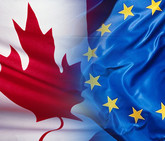Generics/Research
Right of appeal provision in CETA
The Comprehensive Economic and Trade Agreement (CETA) between the European Union (EU) and Canada has the potential to have a negative affect on the generics industry in Canada [1], with certain provisions being seen as causing the most harm.
Data protection provisions in CETA
The trade agreement between the European Union (EU) and Canada has the potential to have a negative affect on the generics industry in Canada [1]. In particular, certain intellectual property provisions are seen as the main culprits.
Patent term restoration provisions in CETA
Some of the provisions included in the Comprehensive Economic and Trade Agreement (CETA) between the European Union (EU) and Canada are seen as having the potential to have a negative affect on the generics industry in Canada [1].
Influence of CETA on generics
On 18 October 2013, the European Union (EU) and Canada reached a political agreement on the key elements for a Comprehensive Economic and Trade Agreement (CETA). However, CETA has been criticized for the fact that it affects intellectual property rights in Canada, but not the EU. Some of the provisions included in the agreement are seen as having the potential to have a negative affect on the generics industry in Canada.
Factors influencing use of generic asthma drugs in Morocco
Despite the introduction of methods to promote the use of generics, use of generic anti-asthmatic drugs remains limited in Morocco. The Moroccan market therefore remains largely dominated by patent-protected originator drugs [1].
Promoting generics prescribing in the UK
Possible ways to encourage more prescribing of generics in the UK include financial incentives with educational intervention and audit/feedback, according to a review of data on prescribing behaviour [1].
Impact of price cuts on spending on hyperlipidaemic drugs in South Korea
Rapidly increasing pharmaceutical expenditures have become a constant challenge to the sustainability of healthcare systems across countries including Korea.
Generic atypical antipsychotic drugs in Belgium
Health authorities are continually looking to increase the utilization of low cost generics to save considerable monies without compromising care, given the ever increasing pressure on available resources. Pressures are driven by ageing populations, the continual launch of new premium-priced drugs and stricter clinical management targets. The quest is enhanced by the number of standard drugs losing their patents in recent years.
Impact of delisting ARBs in Denmark
Health authorities are looking to increase the utilization of low cost generics to save considerable resources without compromising care. This includes Denmark [1].
Pharmacists’ attitudes towards generics in Czech Republic
A study carried out in the Czech Republic found that whether pharmacists routinely carried out generics substitution depended on their familiarity with the relevant legislation and their attitude towards generics substitution [1].













